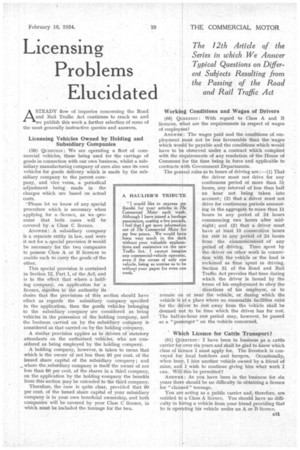Licensing Problems Elucidated
Page 41

If you've noticed an error in this article please click here to report it so we can fix it.
ASTEADY flow of inquiries concerning the Road and Rail Traffic Act continues to reach us and we publish this week a further selection Of some of the most generally instructive queries and answers.
Licensing Vehicles Owned by Holding and Subsidiary Companies
'Please let us know of any special procedure which is necessary when applying for a licence, as we presume that both cases . will be covered by a Class C licence.
ANSWER: A subsidiary company is a separate entity in law, and were it not for a special provision it would be necessary for the two companies to possess Class A or B licences to enable each to carry the goods of the other.
This special provision is contained in Section 12, Part 1, of the Act, and is to the effect that where a holding company, on application for a licence, signifies to the authority its
desire that the provisions of this section should have effect as regards the subsidiary company specified in the application, then the goods vehicles belonging to the subsidiary company are considered as being vehicles in the possession of the holding company, and the business. carried on by the subsidiary coMpany is considered as that carried on by the holding company.
A similar provision applies as 'to" drivers of 'statutory attendants on the authorized .vehicles, who are considered as being employed by the holding company.
A holding company, however, is taken to mean that which is the owner of not less than 90 per cent, of the issued share capital of the subsidiary company ; and _where the subsidiary company is itself the owner of not less than .90 per cent, of the shares in a third company, on the application by the holding company the benefits from this section may be extended to the third company.
Therefore, the ease is quite clear, provided that 90 per cent, of the issued share capital of your subsidiary company is in your own beneficial ownership, and both companies will be covered by your Class C licence, in which must be included the tonnage for the two.
Working Conditions and Wages of Drivers (60) QUESTION: With regard to Class A and B licences, what are the requirements in respect of wages of employees?
ANSWER: The wages paid and the conditions of em ployment must not be less favourable than the wages which would be payable and the conditions which would have to be observed under a contract which complied with the requirements of any resolution of the House of Commons for the time being in force and applicable to contracts with Government Departments.
The general rules as to hours of driving are :—(l) That
the driver must not drive for any continuous period of more than 5i hours, any interval of less than half an hour not being taken into account ; (2) that a driver must not drive for continuous periods amounting in the aggregate to more than 11 hours in any period of 24 hours commencing two hours after midnight; and (3) that a driver must have at least 10 consecutive hours for rest in any period of 24 hours from the commencement of any period of driving. Time spent by the driver on other work in connection with the vehicle or the load is reckoned as time -spent in driving. Section 31 of the Road and Rail Traffic Act provides that time during which the driver is bound by the terms of his employment to obey the
directions of his employer, or to remain on or near the vehicle, or during which the vehicle is at a place where no reasonable facilities exist for the driver to rest away from the vehicle shall be deemed not to be time which the driver has for rest. The half-an-hour rest period may, however, be passed as a "passenger" on the vehicle concerned.
Which Licence for Cattle Transport?
(61) QUESTION: I have been in business as a cattle carrier for over six years and shall be glad to know which class of licence I must apply for. The livestock is conveyed for local butchers and farmers. Occasionally, when busy, I hire another vehicle owned by a friend of mine, and I wish to continue giving him what work I can. Will this be permitted?
ANSWER: As you have been in the business for six years there should be no difficulty in obtaining a licence for " claimed" tonnage.
You are acting as a public carrier and, therefore, are entitled to a Class A licence. You should have no difficulty in hiring a vehicle from your friend providing that ha is operating his vehicle under an A or B licence.




















































































